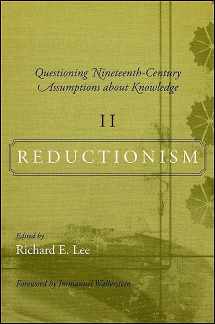
Questioning Nineteenth-Century Assumptions about Knowledge, II: Reductionism (SUNY Series, Fernand Braudel Center Studies in Historical Social Science)
ISBN-13:
9781438434407
ISBN-10:
1438434405
Edition:
Illustrated
Author:
Richard E. Lee
Publication date:
2010
Publisher:
State University of New York Press
Format:
Paperback
224 pages
FREE US shipping
on ALL non-marketplace orders
Marketplace
from $5.60
USD
Marketplace offers
Seller
Condition
Note
Seller
Condition
Used - Like New
Sealed in plastic, never been opened.
Book details
ISBN-13:
9781438434407
ISBN-10:
1438434405
Edition:
Illustrated
Author:
Richard E. Lee
Publication date:
2010
Publisher:
State University of New York Press
Format:
Paperback
224 pages
Summary
Questioning Nineteenth-Century Assumptions about Knowledge, II: Reductionism (SUNY Series, Fernand Braudel Center Studies in Historical Social Science) (ISBN-13: 9781438434407 and ISBN-10: 1438434405), written by authors
Richard E. Lee, was published by State University of New York Press in 2010.
With an overall rating of 3.8 stars, it's a notable title among other
books. You can easily purchase or rent Questioning Nineteenth-Century Assumptions about Knowledge, II: Reductionism (SUNY Series, Fernand Braudel Center Studies in Historical Social Science) (Paperback) from BooksRun,
along with many other new and used
books
and textbooks.
And, if you're looking to sell your copy, our current buyback offer is $0.29.
Description
A provocative survey of interdisciplinary challenges to the concept of reductionism.During the last few decades, the fundamental premises of the modern view of knowledge have been increasingly called into question. Questioning Nineteenth-Century Assumptions about Knowledge, II: Reductionism provides an in-depth look at the debates surrounding the status of “reductionism” in the sciences, social sciences, and the humanities in detailed and wide-ranging discussions among experts from across the disciplines. Whether or not there is or should be a basic epistemological stance that is different in the sciences and humanities, and whether or not such a stance as exemplified by the approach to reductionism is changing, has enormous consequences for all aspects of knowledge production. Featured are an overview and subsequent discussion of this pervasive concept in the social sciences that parses reductionism into the categories of strong social constructionism and antiessentialism, social ontology and the apathetic actor, dualisms, and individualism. Also of interest in chapters and follow-up discussions are the relations between essentialism and emergentism in complex systems theory.“Modern knowledge, according to the contributors to this multivolume exercise (based on three symposia), is based on three questionable premises and principles: determinism, reductionism, and dualism. Each volume interrogates these three principles and seeks to find alternative and more satisfying bases for knowledge. The volumes include formal papers as well as commentaries and edited transcripts of the discussions at each symposium. The range is truly extraordinary, with papers covering everything from economics to opera, cognitive neuroscience, literary studies, mathematical modeling, and systems theory … [the volumes] open a host of questions for scholars to ponder and suggest many enlightening lines of inquiry … Highly recommended.” — CHOICE


We would LOVE it if you could help us and other readers by reviewing the book
Book review

Congratulations! We have received your book review.
{user}
{createdAt}
by {truncated_author}


